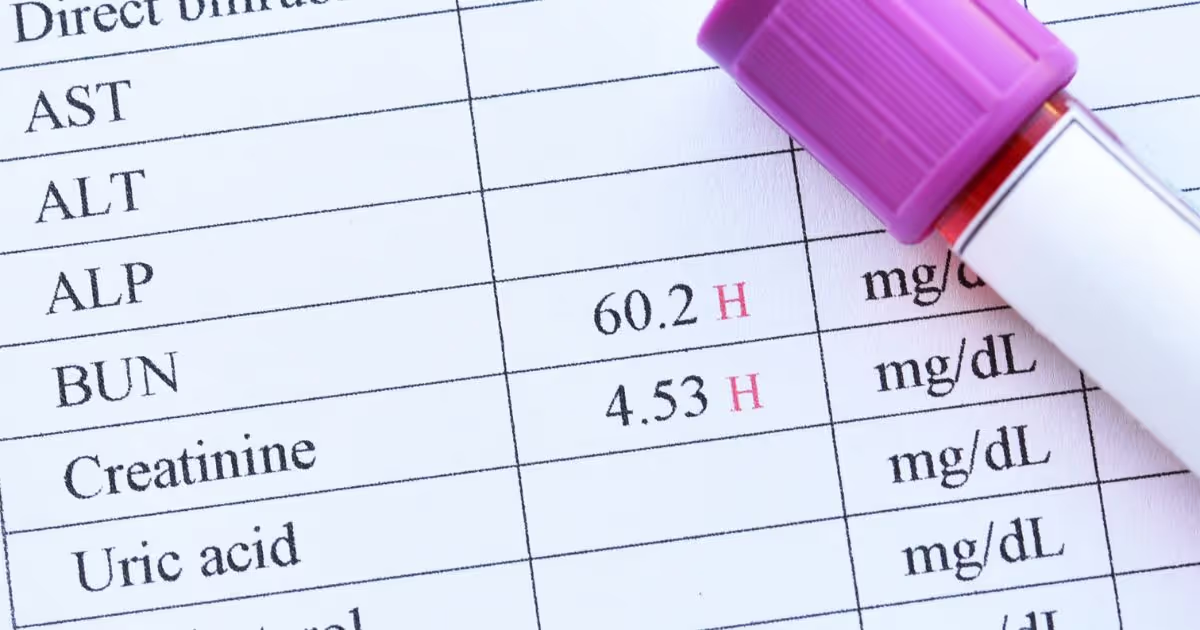Choose the content to read
- What Are Kidney Function Tests?
- Why Kidney Tests Are Necessary?
- What are the types of Kidney Function Tests?
- Blood Urea Nitrogen (BUN) test
- Serum Creatinine Test
- Estimated Glomerular Filtration rate (eGFR)
- FAQ
- A note from MedPark's doctor
What Are Kidney Function Tests?
Kidney function tests refer to medical tests used to evaluate the functions and health of kidneys. There are several kidney function tests, usually involving blood and urine tests.
Why Kidney Tests Are Necessary?
The kidneys play a crucial role in various functions of the body, including regulating the production of red blood cells, hormones that regulate blood pressure, and conversion to the active form of vitamin D. Some health conditions, such as hematuria, dysuria, frequent urination, and low urine output can be indicative of kidney function problems. In addition, hypertension and diabetes can have an impact on the functions of the kidneys.
Kidney function tests are beneficial in these situations to help monitor the conditions.
What are the types of Kidney Function Tests?
Tests for kidney functions are of two distinct types: blood and urine tests.
- Blood tests for kidney function include:
- Blood urea nitrogen (BUN)
- Serum creatinine
- Estimated glomerular filtration rate (eGFR)
- Urine tests for kidney functions include:
- Microalbuminuria
- Urinalysis
This article will focus mainly on serum BUN, creatinine testing, and eGFR.
Blood Urea Nitrogen (BUN) test
A blood urea nitrogen, or "BUN" test, measures urea nitrogen levels in the blood. Urea nitrogen is a waste product of amino acid metabolism and is typically filtered out of the blood by the kidneys and excreted with the urine. Therefore, elevated blood urea nitrogen may indicate kidney function problems.
Normal ranges of the Blood Urea Nitrogen (BUN)
The normal range of BUN is between 6 to 24 mg/dL. However, these may vary and depend on the specific laboratory reference range.
Heightened levels of BUN may indicate abnormality in kidney function, but they can also be due to:
- A high-protein diet
- Medications such as certain antibiotics
- Congestive heart failure
- Dehydration
- Gastrointestinal bleeding
- Severe burns
- Shock
- Urinary tract obstruction
In addition to BUN, creatinine is also measured to determine kidney function. Like BUN, high blood creatinine levels often indicate kidney issues.
Serum Creatinine Test
A serum creatinine test checks how well the kidneys perform their functions. This test typically measures the level of creatinine in the serum. The word "serum" refers to the liquid part of the blood. Creatinine is a waste product from muscle metabolism. The kidneys filter out creatinine from the blood like urea.
Elevated serum creatinine is indicative of poor kidney function.
A serum creatinine test is appropriate when:
- Warning signs of kidney disease develop.
- A patient is at risk of developing kidney problems.
- Established kidney patients require ongoing monitoring.
- Checking the function of a transplanted kidney.
The normal serum creatinine level
Since the creatinine filtration rate is constant, serum creatinine levels should be stable. If serum creatinine is abnormally high, it may signal poor kidney function.
The normal ranges for serum creatinine are:
- Adult male, 0.74 to 1.35 mg/dL
- Adult female, 0.59 to 1.04 mg/dL
Serum creatinine is usable for estimating the glomerular filtration rate or GFR, which is how rapidly the kidneys filter blood per minute. Although GFR can be measured directly, it is cumbersome.
Therefore, GFR is typically estimated based on the levels of serum creatinine. eGFR is the abbreviation of estimated GFR.
Estimated Glomerular Filtration rate (eGFR)
Glomerular filtration rate (GFR) is a direct measure of kidney functions. GFR test measures the filtration volume from blood in the kidneys per minute. As mentioned above, GFR can be measured directly, but is cumbersome to do. Hence, doctors estimate GFR with creatinine test results for convenience.
Symptoms of kidney disease, such as frequent urination and muscle spasms, may not occur until the kidney function falls below 60%. eGFR is beneficial screening for kidney disease, enabling prompt treatment.
eGFR may be measured to monitor kidney health if you have:
- Congenital disease affecting kidney function.
- Coronary artery disease.
- Diabetes.
- Family history of kidney disease.
- Frequent urinary tract infections (UTIs).
- Heart disease.
- History of smoking.
- Hypertension.
- Obesity.
- Urinary tract obstruction.
Interpretation of eGFR value
The higher the eGFR, the better the kidney function is. Ranges of eGFR are classifiable as follows:
- eGFR of 90 and above: This range indicates a normal condition or mild kidney damage.
- eGFR between 60 and 89: This indicates mildly decreased kidney function.
- eGFR between 30 and 59 indicates moderate to severe decreased kidney function. Symptoms may develop in people with eGFR in this range.
- eGFR between 15 and 29: This range indicates severely compromised kidney function.
- eGFR below 15: eGFR in this range signifies kidney failure. It indicates that your kidney function is less than 15%. It is considered the most severe stage and potentially life-threatening. A kidney transplant or dialysis is necessary for patients at this stage.
FAQ
- What is the turnaround time for a kidney function test?
It is usually available within hours or may take a few days if the test is at an outside clinical laboratory. - What will happen if the results of a kidney function test are abnormal?
If the test is abnormal, it may be ordered more often in the future to keep track of your health.
A note from MedPark's doctor
Kidney function tests can assess how well your kidneys are functioning. Typically involving blood and urine tests, these assessments are essential for monitoring kidney health and enabling prompt intervention due to the vital functions performed by the kidneys.






